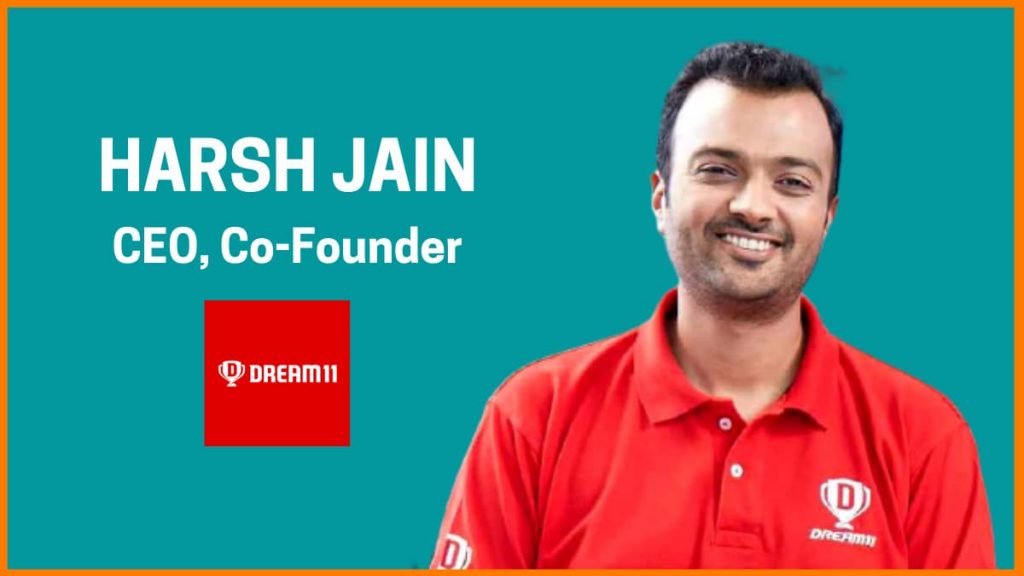Harsh Jain says that it’s a “well-known fact” that he doesn’t use his own fantasy sports app, at least for fantasy football.
“I am still committed to fantasy football on Fantasy Premier League, the reason we created Dream11.”


Fantasy sports are online games where people make teams out of proxies that are based on real athletes. Based on how these players do in the real world, they can earn points and win cash prizes.
In the early 2000s, fantasy football was already very popular in the U.K. Jain got hooked on it while he was in high school there.
After telling his childhood friend Bhavit Sheth about it, he and Sheth went to India to look for a platform for fantasy cricket. They couldn’t find what they were looking for, so in 2008, they made their own.
“What happens if you get hit by the bus?” “Are you building scale and systems in a way that is… not dependent on [a single person] and… having one person make a decision?” Harsh Jain, CO-FOUNDER, AND CEO, of DREAM SPORTS
Jain says that their company, Dream Sports, which is the parent company of Dream11, has done very well because they were the first to do what it did.
“Once you and your friends are connected over one network in fantasy sports, a rival has to move all your friends with you to get you to play there,” said Jain, who is also the CEO of Dream Sports.
“Because you set up leagues, all of your friends are playing against each other.”
Dream Sports is not only India’s first sports tech unicorn, but the company is also said to have “almost 90% of the fantasy sports market” in the country.
The 36-year-olds talk about three ways to run a successful business.
1. Unplug
As leaders of their company, Jain and Sheth told CNBC Make It that their “fundamental principle” is to make sure that their business doesn’t depend on either of them.
“What happens if you get hit by a bus?” asked Jain. Are you building scale and systems in a way … not dependent on [a single person] and … having one person make a decision?”
So, the co-founders made sure that everyone who worked at Dream Sports, including themselves, had a week of “unplug” time.
“Once a year, you’re kicked out of the [company’s] system for a week… you don’t have Slack, emails, or phone calls,” Jain added.
“Because it helps you a lot to have that one week of uninterrupted time, and it helps the business to know if we’re dependent on anyone.”
Jain also said that anyone who talks to another worker during “unplug” time has to pay a fine of about $1,200. So far, that has worked, the co-founders said.
Sheth, who is also the chief operations officer, said with a laugh, “No one wants to be that jerk who calls someone who was unplugged.”
2. Learn from rejection
When Jain and Sheth tried to get early-stage funding from venture capital firms 10 years ago, they said they heard “no” at least 150 times.
“We talked to all the Indian venture capitalists, and they all said, ‘This is an American idea. There aren’t many fantasy sports in India… Why don’t you try to get money in the United States?'”
But it was just as hard for Jain to get money in both New York and San Francisco.
“There, every venture capitalist told me to go back to India. “‘It’s an Indian company, so raise money in India!'” Jain thought back. “Then I figured out that it was just a nice way to say no.”
Instead of getting down, Jain and Sheth used the rejections as fuel.
“Early-stage investors are actually looking for founders with a lot of passion and products that have a big market.” Harsh Jain is the co-founder and CEO of DREAM SPORTS.
“The most important thing I learned was that at every meeting, you can find out why they said no by asking, “What’s your biggest concern?”
Jain and Sheth said that it took them almost two years to get their pitch right.
“Early-stage investors are actually looking for founders who are very passionate and products that have a big market,” Jain said.
“Early success, a high number of users who stick around… and people who are going to stay there and not give up.” “I think that’s what finally helped us get the pitch.”
Since then, big-name investors like the Chinese tech giant Tencent, the American investment firm Tiger Global, and the Hong Kong-based Steadview Capital have joined Dream Sports’ plan to connect with India’s millions of sports fans.
Its last round of fundraising, in 2021, brought in $840 million, which gave the company a value of $8 billion.
3. Shut out the noise
“From the outside, the life of an entrepreneur always looks more exciting,” Jain said.
The childhood friends know this all too well because they lost “a couple of million dollars” worth of start-up money when they were only 26 years old.
“Every founder, when they start something, really believes that it will take off and change the world… and ours went down in flames.”
But problems kept coming up even after the company switched from a “free-to-play” model to a “freemium” model in 2012.
“It was hard to find the right business model from 2008 to 2012. From 2012 to 2014, it was hard to get money. “It’s been hard to meet investors’ expectations in 2015 so far,” Jain said.
Rising interest rates, inflation, and the possibility of a global economic downturn are putting pressure on the prices of private companies right now.
But Dream Sports says that it has been making money since 2020, and the news site Entrackr says that it is one of the few unicorns in India that is making money.
Jain said, “As a business, we’ve always focused on having good unit economics.” “We have nothing to say… but yeah, there’s always something to fight.”
What kept the childhood friends going was “sheer persistence” and a firm belief that fantasy sports could catch on in India.
Jain said that they knew it would work one way or another and that they “just had to be patient, keep turning, and find that right hook that gets that flywheel going.”
“Everyone is going to say to you, ‘It’s too hard. “Don’t give up,” Sheth said.
“But if you think you’re working on something important, you just need to be able to tune out the noise and keep going.”




